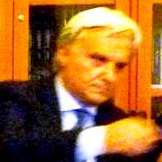“A scherzo with a fatal conclusion” Strauss defined this opera, in an attempt to reassure both the performers and the critics before the premiere in Dresden, and to minimise the effects of shocking final scene in which Salome kisses the severed head of Jochanan. Yet, there is no scherzo (Italian for “joke”), or irony or pure amusement in the piece: with its odd timbric features, its frenzied dissonances, its unsteady rhythms, and a masterful employment of diverse styles, Salome is a work of immense originality, with which Strauss poked his finger in the eye of the right-minded and conservative public of his time: the obsessed and depraved eroticism of the young protagonist astonished fin-de-siècle audiences.
Nonetheless, there is much more to it than sex, and in spite of the fact that it was (and still is) accused of indecency and that the tinge of scandal has cast a perpetual shadow on it, Salome exercised a broad influence on the operatic music of the 20th century. As a matter of fact, the most outrageous element for present-day sensibility remains, beyond Strauss's opera eroticism and necrophilia, its lack of a moral stance.
Strauss wrote no overture to gently take the listener into the plot, no easy tunes to relieve the unbearable tension throughout the long one act piece, whose score is highly demanding both for singers and for musicians.
The vocal range of the title-role is one of the mostchallenging, as it goes from a bright high B to a dark G below middle C, and the theatrical situation necessitates a truly acting soprano who has to be credible in outlining such emotionally disturbing actions. Annemarie Kremer was a Salome of outstanding talent; she was inspired in creating a teenaged, spoiled princess, sexually awakened and manipulative. Her obsession for the body of Jochanaan becomes more and more alarming. Her performance was vocally striking, as she rendered both text and music with highest intelligence.
Kremer’s enthralling interpretation received suitable backing from the other roles: Kim Negley depicted a lewd Herod, as the score traditionally suggests, but emphasised the childish jerks of a senescent despot more than his lascivious side, with a vocally shrewd characterisation. Markus Marquardt was just right as the prophet Jochanaan, with a noble sounding voice and a resolute scenic presence.
As for Herodias, the libretto does not give much space to wide-ranging expressions for the character. Natascha Petrinsky was more than routinely good at conveying indignation for the allegations of Jochanaan, only sometimes overacting when expressing nasty contentment for the revenge she is granted by her daughter request of the prophet’s head. Tenor Wookyung Kim was a neurotic Narraboth, performing with vocal clarity, beauty and lightness of colour.
The opera’s most famed part, the Dance of the Seven Veils, was performed by Kremer herself who was accompanied by seven dancers. Famously, the price she asks for her dance is the head of Jochanaan; we hear a dreadful plucking of the basses while the executioner is descending into the cistern where Jochanaan is imprisoned, the climax being reached when Salome embraces the severed head, with the blood soaking her garment, and eventually kisses the dead lips.
Gabriele Ferro was remarkable in the way he represented the originality, appeal and horror of Strauss's score. He provided a conducting of extraordinary depth and breadth, yet never permitting the orchestra to overcome the singers on stage.
Director Schweigkofler, assisted by the set by Nicola Rubertelli and costumes by Kathrin Dorigo, immersed the drama in a sort of no place-no time atmosphere, though they were tinged with a tang of the early decades of the twentieth century, the prurient age when the piece appeared. But although the production setting is not historically prcise, it is wholly faithful to the libretto, showing the terrace of Herod’s palace with its big staircase and a cistern lid in the centre. The inclined giant mirror dominating the stage and reflecting the drawing reproduced on the floor added to the unceasing sense of alienation felt by the public, who at the end applauded enthusiastically.




